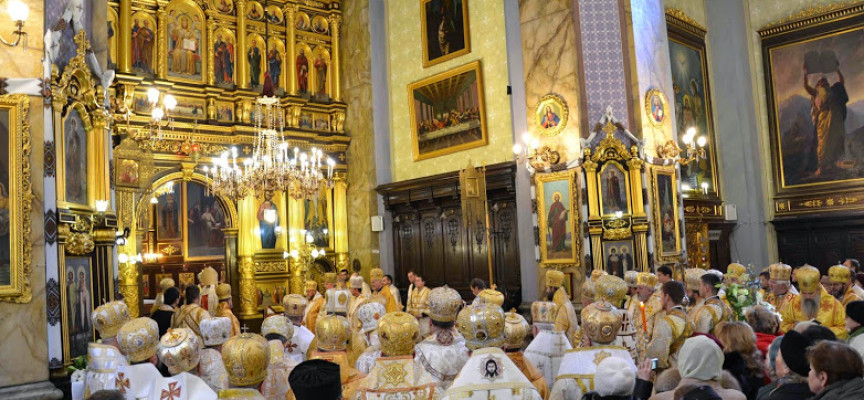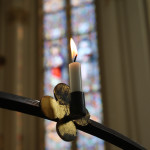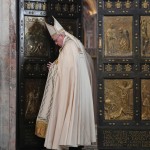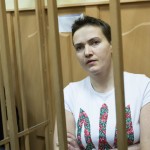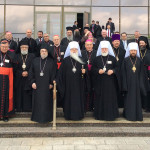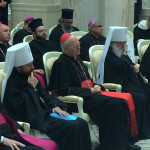The annual meeting of the Eastern Catholic Hierarchs of Europe was held in Lviv (Ukraine), on the occasion of the 25th anniversary of the legalization of the Ukrainian Greek-Catholic Church, at the invitation of His Beatitude Sviatoslav Shevchuk, Archbishop Major of Kyiv-Halyč.
In Lviv, 45 Eastern Catholic bishops in Europe have been discussing the identity and mission of the Eastern Catholic Churches in the ecumenical movement and in European societies. The sessions included contributions by: the Apostolic Exarch for Catholics of Byzantine Rite in Greece, Msgr. Dimitrios Salachas; Msgr. Virgil Bercea, Bishop of Oradea-Mare (Romania); and Msgr. Borys Gudziak, Bishop of the Eparchy of Saint Vladimir the Great in Paris and of the Ukrainian Greek-Catholics in France, Benelux, and Switzerland. The meeting, sponsored by the Council of Catholic Bishops’ Conferences of Europe (CCEE), was attended by Msgr. Thomas Edward Gullickson, Apostolic Nuncio in Ukraine; Archbishop Cyril Vasil’, Secretary of the Congregation for the Oriental Churches; Msgr. Mieczyslaw Mokrzycki, Latin Archbishop of Lviv; and Fr. Michel Remery, Deputy Secretary General of CCEE.
At the end of their meeting, the bishops adopted the following message.
Message of the Eastern Catholic Bishops
Lviv, Ukraine, October 26, 2014
We, bishops representing various sui iuris Churches in Europe, have gathered in Lviv (Ukraine) in October 23 through 26, 2014, to reflect and have a dialogue on the mission of the Eastern Catholic Churches fifty years after the promulgation of the Conciliar Decrees Orientalium Ecclesiarum and Unitatis redintegratio, and on the occasion of the 25th anniversary of the legalization of the Ukrainian Greek-Catholic Church.
At the end of our meeting, we would like to share some thoughts.
The Role of the Eastern Catholic Churches and their Contribution to the Ecumenical Journey
On the basis of the Conciliar pronunciation that expressed the care of the Catholic Church for the Eastern Churches and invited them to flourish and with new apostolic vigour execute the task entrusted to them(see Orientalium Ecclesiarum 1) :
– We reaffirm with greater awareness our right and duty to the pastoral care of our faithful wherever they are, including the right to proclaim the Gospel to those who do not know it yet;
– We express our fraternal wish that also the Orthodox Churches may carry out in love and truth the mission that God has entrusted to them;
– We recognize to the Orthodox Churches the same concern for the care of their own faithful throughout the world, without any antagonism, and in full respect of the right to freedom of religion;
– We affirm that the division of the one Church of Christ is an ecclesiological anomaly which cannot be considered as a standard for the life and mission of the Church;
– We share with the Orthodox Churches the same concern for the cultural and social trends that are leading to a progressive de-Christianization and secularization of Europe;
– We believe we are called to a strong commitment because the call for the unity of the Church of Christ is one of the necessary, priority, and irreversible dimensions of the identity of the Eastern Catholic Churches, in spite of the difficulties and hardships of the ecumenical journey;
– We confirm that the Eastern Catholic Churches want to be actively involved in the dialogue of charity and truth that the Catholic Church brings ahead with the Orthodox Churches.
The Situation in the Middle East
The plight of Christians living in the Middle East and other religious and ethnic minorities who are suffering because of the violence raging across the region has been the subject of our reflection and prayer. While ensuring our support and solidarity to the local pastors and their faithful, we remind everyone that peace and reconciliation in the Middle East will not come except through a clear and decisive intervention of the international community on all the parties concerned, aimed in particular at promoting freedom of religion and consciousness, and through a strong investment in education to create new generations that are inclined to dialogue.
25th Anniversary of the Legalization of the Ukrainian Greek-Catholic Church
We came to Ukraine also to celebrate the 25th Anniversary of the Legalization of the Ukrainian Greek-Catholic Church. Its renaissance is an event of the Divine Providence which is now prompting the whole Church to careful discernment, a renewed missionary proclamation of the Gospel, and a greater commitment especially in the face of the new pastoral challenges brought about by the current situation in the country. We express to the whole Ukrainian people our prayer, closeness, and solidarity in the face of the continuing military conflict in the Eastern part of the country, along with the external aggression which causes so much suffering, especially among civilians. We invite everyone to take without delay the path of peace and reconciliation.
This anniversary was liturgically experienced by imploring God’s blessing and the protection of the Theotokos, Mother of God and Mother of the Church.
L’incontro annuale dei gerarchi cattolici orientali d’Europa si è svolto quest’anno a Leopoli (Ucraina), in occasione del 25° anniversario della legalizzazione della Chiesa greco-cattolica ucraina, su invito di sua beatitudine Sviatoslav Shevchuk, arcivescovo maggiore di Kyiv-Halyč.
A Leopoli, 45 vescovi orientali cattolici in Europa si sono confrontati sull’identità e la missione delle Chiese orientali cattoliche nel movimento ecumenico e nelle società europee. I lavori hanno visto gli interventi dell’esarca apostolico per i cattolici di rito bizantino in Grecia, mons. Dimitrios Salachas, di mons. Virgil Bercea, vescovo di Oradea-Mare (Romania), e di mons. Borys Gudziak, vescovo dell’eparchia di San Vladimiro il Grande di Parigi per gli ucraini greco cattolici in Francia, Benelux e Svizzera. All’incontro, patrocinato dal Consiglio delle Conferenze Episcopali d’Europa (CCEE), hanno partecipato mons. Thomas Edward Gullickson, nunzio apostolico in Ucraina, mons. Cyril Vasil’, arcivescovo segretario della Congregazione per le Chiese orientali, mons. Mieczyslaw Mokrzycki, arcivescovo latino di Leopoli, e don Michel Remery, vice segretario generale del CCEE.
Al termine del loro incontro i vescovi partecipanti hanno adottato il seguente messaggio.
Messaggio dei vescovi orientali cattolici
Leopoli, Ucraina, 26 ottobre 2014
Noi vescovi rappresentanti diverse Chiese sui iuris in Europa ci siamo radunati a Leopoli (Ucraina) nei giorni 23-26 ottobre 2014 per riflettere e confrontarci attorno al tema della missione delle Chiese orientali cattoliche a cinquant’anni della promulgazione dei decreti conciliari Orientalium Ecclesiarum e Unitatis Redintegratio e nel 25mo anniversario della legalizzazione della Chiesa greco-cattolica ucraina.
Al termine del nostro incontro, desideriamo condividere alcune riflessioni.
Ruolo e contributo delle Chiese orientali cattoliche al cammino ecumenico
A partire dall’affermazione conciliare che esprime la sollecitudine della Chiesa cattolica per le Chiese orientali e che invita alla loro fioritura e all’assolvimento della loro missione con nuovo vigore apostolico (cfr. Orientalium Ecclesiarum, 1),
– riconfermiamo con maggiore consapevolezza il nostro diritto e dovere alla cura pastorale dei nostri fedeli ovunque si trovino come anche il diritto all’annuncio del Vangelo a coloro che non lo conoscono ancora;
– esprimiamo il nostro fraterno augurio affinché le Chiese ortodosse, anche loro, svolgano nell’amore e nella verità la missione che Dio ha loro affidato;
– riconosciamo parimenti alle Chiese ortodosse la stessa sollecitudine per la cura dei propri fedeli ovunque nel mondo, senza nessun antagonismo e rispettando il diritto alla libertà religiosa;
– affermiamo che la divisione della unica Chiesa di Cristo è una anomalia ecclesiologica la quale non può essere considerata come una norma per la vita e la missione della Chiesa;
– condividiamo con le Chiese ortodosse la stessa preoccupazione per le tendenze culturali e sociali che portano alla progressiva scristianizzazione e secolarizzazione dell’Europa;
– siamo convinti di essere chiamati a un forte impegno perché l’appello all’unità della Chiesa di Cristo costituisce una delle necessarie, prioritarie e irreversibili dimensioni dell’identità delle Chiese orientali cattoliche, nonostante le difficoltà e le fatiche del cammino ecumenico;
– ricordiamo che le Chiese orientali cattoliche intendono essere attivamente coinvolte nel dialogo di verità e di carità che la Chiesa cattolica svolge con le Chiese ortodosse.
La situazione in Medio-Oriente
La drammatica situazione che vivono i cristiani del Medio Oriente e le altre minoranze religiose ed etniche che soffrono a causa della violenza che imperversa in tutta la regione è stata oggetto della nostra riflessione e preghiera. Assicurando ai pastori locali e ai loro fedeli la nostra vicinanza e solidarietà, ricordiamo che pace e riconciliazione in Medio Oriente non giungeranno se non attraverso un intervento chiaro e deciso della comunità internazionale su tutte le parti coinvolte, volto a promuovere in particolare la libertà religiosa e di coscienza, e un forte investimento nell’educazione per creare nuove generazioni capaci di dialogare tra loro.
25° anniversario della legalizzazione della Chiesa greco-cattolica ucraina
Siamo giunti in Ucraina anche per celebrare il 25° anniversario della legalizzazione della Chiesa greco-cattolica ucraina. La sua rinascita è un evento della Provvidenza divina che spinge oggi tutta la Chiesa a un attento discernimento, a una rinnovata missionarietà nell’annuncio del Vangelo e a un maggiore impegno specialmente di fronte alle nuove sfide pastorali che l’attuale situazione del Paese presenta. Esprimiamo a tutto il popolo ucraino preghiera, vicinanza e solidarietà di fronte al perdurare del conflitto militare nell’Est del Paese, accompagnato dall’aggressione esterna, che provoca tanta sofferenza, specialmente alla popolazione civile. Invitiamo tutti a imboccare senza indugio la via della pace e della riconciliazione.
Questa ricorrenza è stata vissuta liturgicamente implorando la benedizione di Dio e la protezione della Theotokos, Madre di Dio e Madre della Chiesa.
Mission et rôle des Eglises orientales catholiques
La rencontre annuelle des dignitaires catholiques orientaux d’Europe s’est déroulé cette année à Lviv (Ukraine) à l’occasion du 25ème anniversaire de la légalisation de l’Eglise gréco-catholique ukrainienne, sur invitation de Sa Béatitude Sviatoslav Shevchuk, Archevêque Majeur de Kyiv-Halyč.
A Lviv, 45 évêques catholiques orientaux en Europe ont abordé le thème du rôle et de la mission des Eglises Orientales Catholiques dans le mouvement œcuménique et dans les sociétés européennes. Parmi les rapporteurs, nous pouvons citer l’Exarque Apostolique pour les catholiques de rite byzantin en Grèce, mons. Dimitrios Salachas, mons. Virgil Bercea, Evêque de Oradea-Mare (Roumanie) et mons. Borys Gudziak, Evêque de l’Eparchie de Saint Vladimir-le-Grand de Paris pour les ukrainiens de France, Bénélux et Suisse. À la rencontre, organisée sous le patronat du Conseil des Conférences Episcopales d’Europe (CCEE) ont participé mons. Thomas Edward Gullickson, Nonce Apostolique en Ukraine;mons. Cyril Vasil’, Archevêque Secrétaire de la Congrégation pour les Eglises Orientales mons. Mieczyslaw Mokrzycki, archevêque latin de Lvivet le p. Michel Remery Vice-secrétaire Général du CCEE.
A la fin de leur rencontre, les évêques participants ont adopté le message suivant.
Message des évêques catholiques orientaux
Lviv, Ukraine, 26 octobre 2014
Nous, évêques représentant différentes Eglises sui iuris en Europe, nous sommes réunis à Lviv (Ukraine) du 23 au 26 octobre 2014 pour réfléchir et discuter du thème de la mission des Eglises Orientales Catholiques, cinquante ans après la promulgation des décrets conciliaires Orientalium Ecclesiarum et Unitatis Redintegratio et à l’occasion du 25ème anniversaire de la légalisation de l’Eglise gréco-catholique ukrainienne.
À la fin de notre rencontre, nous souhaitons partager un certain nombre de réflexions.
Rôle et contribution des Eglises orientales catholiques dans le parcours œcuménique
En partant de l’affirmation conciliaire qui exprime l’estime de l’Eglise catholique à l’égard des Eglises orientales et qui invite à leur épanouissement et à l’accomplissement de leur mission avec une vigueur apostolique renouvelée (cfr. Orientalium Ecclesiarum, 1),
– nous désirons confirmer encore une fois avec une conscience accrue, notre droit et devoir d’assurer le soin pastoral de nos fidèles où qu’ils se trouvent, ainsi que le droit à l’annonce de l’Évangile pour ceux qui ne le connaissent pas encore ;
– nous exprimons notre souhait fraternel afin que les Eglises orthodoxes puissent, à leur tour, dérouler dans l’amour et dans la vérité la mission que Dieu leur a confiée ;
– de la même façon, nous reconnaissons aux Eglises orthodoxes, la même sollicitude pour le soin de leurs fidèles où que ce soit dans le monde, sans aucun antagonisme et dans le respect du droit de la liberté religieuse ;
– nous affirmons que la division de la seule et unique Eglise du Christ est une anomalie ecclésiologique qui ne peut être considérée comme une norme pour la vie et la mission de l’Eglise ;
– nous partageons avec les Eglises orthodoxes la même préoccupation à l’égard des tendances culturelles et sociales qui conduisent à la déchristianisation et à la sécularisation progressives de l’Europe ;
– nous sommes certainement appelés à nous engager fortement car l’appel à l’unité de l’Eglise du Christ est l’une des dimensions nécessaires, prioritaires et irréversibles de l’identité des Eglises orientales catholiques, malgré les difficultés et la fatigue du parcours œcuménique ;
– nous rappelons que les Eglises orientales catholiques veulent être activement impliquées dans le dialogue de vérité et de charité que l’Eglise catholique mène avec les Eglises orthodoxes.
La situation au Moyen-Orient
La situation dramatique que vivent les chrétiens du Moyen-Orient et les autres minorités religieuses et ethniques qui souffrent à cause de la violence qui sévit dans toute la région, a fait l’objet de notre réflexion et de notre prière. Tout en assurant aux pasteurs locaux et à leurs fidèles notre proximité et notre solidarité, nous désirons rappeler que la paix et la réconciliation au Moyen-Orient n’aboutiront que à travers une intervention claire et nette de la communauté internationale sur toutes les parties concernées, dans le but de promouvoir notamment la liberté religieuse et de conscience, sans oublier un fort investissement dans l’éducation visant à créer de nouvelles générations qui soient en mesure de dialoguer entre elles.
25ème anniversaire de la légalisation de l’Eglise gréco-catholique ukrainienne
Nous non sommes rendus en Ukraine également pour célébrer le 25ème anniversaire de la légalisation de l’Eglise gréco-catholique ukrainienne. Sa renaissance est un événement de la Providence divine qui pousse aujourd’hui toute l’Eglise à mener un discernement attentif, à adopter un missionnarisme renouvelé dans l’annonce de l’Évangile et à s’engager encore plus fortement surtout par rapport aux nouveaux défis pastoraux que pose la situation actuelle du pays. Nous désirons assurer à tout le peuple ukrainien notre prière, notre proximité et notre solidarité face au conflit militaire qui sévit encore dans l’Est du pays, accompagné par l’agression externe, qui provoque tant de souffrances, notamment à la population civile. Nous invitons tous à vouloir entamer sans attendre la voie de la paix et de la réconciliation.
Cette situation a été vécue dans la liturgie en implorant la bénédiction de Dieu et la protection de la Théotokos, Mère de Dieu et Mère de l’Eglise.
Identität und Sendung der orientalischen Kirchen
Auf Einladung Seiner Seligkeit Sviatoslav Shevchuk, Großerzbischof von Kyiv-Halyč, fand das jährliche Treffen der geistlichen Oberhäupter der katholischen Ostkirche in diesem Jahr anlässlich des 25. Jahrestages der Legalisierung der Ukrainischen Griechischen-Katholischen Kirche in Lemberg (Ukraine), im Zentrum für geistliche Übungen, Vul. Shyroka 4 – Briukhovychi (Lviv) statt.
Hier haben die 45 versammelten Bischöfe über die Rolle und die Sendung der katholischen Ostkirche im Rahmen der ökumenischen Bewegung aber auch der europäischen Gesellschaften debattiert. Folgende Redner haben beim Treffen einen Vortrag halten: Mgr. Dimitrios Salachas, apostolischer Exarch der Katholiken des orientalischen Ritus in Griechenland, Mgr. Virgil Bercea, Bischof von Großwardein (Rumänien) und Mgr. Borys Gudziak, Bischof der Eparchie Sankt Wladimir der Große in Paris für die ukrainischen Gläubigen des orientalischen Ritus in Frankreich, in den Benelux-Staaten und in der Schweiz. An dem Treffen, der unter der Schirmherrschaft des Rates der Europäischen Bischofskonferenzen Europas (CCEE) organisiert wurde, haben sich auch Mgr. Thomas Edward Gullickosn, Apostolischer Nuntius in der Ukraine, Bischof Cyril Vasil’, Sekretär der Kongregation für die orientalischen Kirchen, Mgr. Mieczyslaw Mokrzycki, lateinischer Erzbischof von Lemberg, und Dom Michel Remery, CCEE-Vize-Generalsekretär, beteiligt.
Am Ende des Treffens haben die versammelten Bischöfe folgende Botschaft verabschiedet.
Botschaft der Bischöfe der katholischen Ostkirche
Lemberg, Ukraine, 26. Oktober 2014
Wir, die Bischöfe unterschiedlicher Rituskirchen sui iuris in Europa sind vom 23. bis zum 26. Oktober 2014 in Lemberg zusammengekommen, um über die Sendung der katholischen Ostkirche 50. Jahre nach der Verabschiedung der Dekrete des Zweiten Vatikanischen Konzils Orientalium Ecclesiarum und Unitatis Redintegratio sowie 25. Jahre nach der Legalisierung der Ukrainischen Griechischen-Katholischen Kirche nachzudenken und zu debattieren.
Am Ende unseres Treffens möchten wir einige Überlegungen an die Öffentlichkeit bringen.
Rolle und Beitrag der katholischen Ostkirche zur ökumenischen Bewegung
Ausgehend von der Hochschätzung der katholischen Kirche für die Ostkirchen, die von ihr aufgefordert werden neu zu erblühen und die ihnen anvertraute Aufgabe mit frischer apostolischer Kraft zu meistern (vgl. Orientalium Ecclesiarum, 1),
– bestärken wir mit größerem Bewusstsein unser Anrecht und unsere Pflicht, die Seelsorge unserer Gläubigen weltweit zu betreuen, genauso wie das Anrecht, denjenigen, die es noch nicht kennen, das Evangelium zu verkünden;
– wünschen wir uns, dass auch die orthodoxen Kirchen liebevoll und wahrheitsgetreu die Sendung erfüllen, die Gott ihnen anvertraut hat;
– erkennen wir im Rahmen der Religionsfreiheit und ohne Divergenzen auch den orthodoxen Kirchen die gleiche Fürsorge an, mit der sie ihre Gläubigen weltweit betreuen sollen;
– beteuern wir, dass die Spaltung der einzigen Kirche Christi eine ekklesiologische Anomalie ist und nicht als Norm für das Leben und für die Sendung der Kirche gesehen werden darf;
– teilen wir mit den orthodoxen Kirchen die gleichen Sorgen für die kulturellen und sozialen Entwicklungen, die zu einer progressiven Entchristlichung und Säkularisierung Europas führen;
– sind wir überzeugt, dass wir uns trotz aller Schwierigkeiten und Anstrengungen auf unserem gemeinsamen ökumenischen Weg, stark engagieren müssen, da die Einheit der Kirche Christi eine notwendige, prioritäre und unumkehrbare Dimension der Identität der katholischen Ostkirchen ist;
– erinnern wir daran, dass sich die katholischen Ostkirchen ebenfalls an der Debatte über Wahrheit und Liebe beteiligen möchten, die die katholische Kirche mit den orthodoxen Kirchen führt.
Die Lage im Nahen Osten
Die dramatische Lage der Christen sowie anderer religiöser und ethnischer Minderheiten im Nahen Osten aufgrund der gewalttätigen Auseinandersetzungen in der gesamten Region stand im Mittelpunkt unserer Debatten und Gebete. In dem wir allen Priestern und ihren Gläubigen unsere Nähe und Solidarität ausdrücken, erinnern wir daran, dass weder Friede noch Versöhnung im Nahen Osten ausgehandelt werden können, solange sich die internationale Gemeinschaft nicht eindeutig für die Religions- und Gewissensfreiheit aussprechen und in Bildungsmaßnahmen investieren wird, damit die künftigen Generationen untereinander einen fruchtbaren Dialog führen können.
25igster Jahrestag der Legalisierung der Ukrainischen Griechischen-Katholischen Kirche
Wir haben uns auch anlässlich des 25igsten Jahrestages der Legalisierung der Ukrainischen Griechischen-Katholischen Kirche in der Ukraine versammelt. Ihre Neubelebung ist ein Anzeichen der göttlichen Vorsehung, die die Kirche heute zu genauen Überlegungen, zu ein erneutes missionarisches Engagement bei der Verkündung des Evangeliums und zu einer grösseren Anstrengung insbesondere im Hinblick auf die neuen Pastoralen Herausforderungen im Land anspornt. Wir schliessen die ukrainische Bevölkerung in unsere Gebete ein und drücken ihr unsere Nähe und Solidarität im Hinblick auf die Auseinandersetzungen und den feindlichen Angriff im Osten des Landes aus, der der Zivilbevölkerung so viel Leid zufügt. Wir ersuchen alle Parteien, umgehend den Weg des Friedens und der Versöhnung zu beschreiten.
Um diesen Jahrestag liturgisch zu feiern haben wir Gottes Segen und den Schutz von Theotokos, Muttergottes und Mutter der Kirche ersucht.

